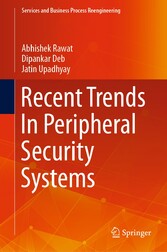Recent Trends In Peripheral Security Systems
von: Abhishek Rawat, Dipankar Deb, Jatin Upadhyay
Springer-Verlag, 2021
ISBN: 9789811612053
, 107 Seiten
Format: PDF
Kopierschutz: Wasserzeichen
Preis: 139,90 EUR
eBook anfordern 
Mehr zum Inhalt

Recent Trends In Peripheral Security Systems
This book covers selected topics and methods for peripheral security, which are gaining attention nowadays. The book discusses the security arrangement and methods for monitoring the inside/outside entry of peripheral areas that need to be secured. It relates to a periphery, often portable device (as well as the methods employed, and systems including such a peripheral device and a host central command device with which the local geographical command device communicates), enabling one or more security operations performed by the peripheral device. It also covers the security scenario of snow-prone areas in a remote location. It also elaborates how we can secure the person and devices in extremely cold conditions and rescue them. This book helps the researchers, academicians, and industry persons working in security areas to protect unauthentic entry in large scale areas that may be defense camps or civilian applications like large-sized bungalows, institutes, and organizations of national importance. The experimental results are in close conformance to the proposed methodologies.
Abhishek Rawat received his Bachelor of Engineering in Electronics and Communication Engineering (2001), from Rajiv Gandhi Technological University, Bhopal. He received his Master of Technology (2006) and Ph.D. (2012) from Maulana Azad National Institute of Technology Bhopal, India. He is currently an Assistant Professor at the Institute of Infrastructure Technology Research and Management (IITRAM), Ahmedabad, Gujarat, India. He has 16 years of research, academic and professional experience in different premier institutions. Dr. Rawat is also senior member IEEE and has published more than 50 articles in international journals, Book chapters, national and international conference proceedings. He received the Young Scientist Award from MPCOST Bhopal in 2007, involved in the field trails of the IRNSS receiver and published four Indian patents. His research interests include Navigation systems, Satellite Communication and Peripheral security etc.
Dipankar Deb completed his Ph.D. from the University of Virginia, Charlottesville, with Prof. Gang Tao, IEEE Fellow and Professor in the Department of ECE in 2007. He did his B.E. from NIT Karnataka, Surathkal (2000), and M.S. from the University of Florida, Gainesville (2004). In 2017, he was elected to be IEEE Senior Member. He has served as Lead Engineer at GE Global Research Bengaluru (2012-2015) and as Assistant Professor in EE, IIT Guwahati 2010-2012. Presently, he is a Full Professor in Electrical Engineering at the Institute of Infrastructure Technology Research and Management (IITRAM), Ahmedabad, Gujarat, India. He is Associate Editor of IEEE Access journal and Book Series Editor for Control System Series/CRC Press/Taylor and Francis Group. He is also a book series editor of 'Studies in Infrastructure and Control' with Springer. He has published 36 SCI-indexed journals, 40 international conference papers, and 10 technical books with Springer and Elsevier. He holds 6 US Patents. His research interests include active flow control, adaptive control, cognitive robotics, and renewable energy systems (including wind, solar, and fuel cells).
Jatin Upadhyay received his M.E. in VLSI and Embedded Systems from Gujarat Technological University in 2015. He is currently a Ph.D. candidate at the Institute of Infrastructure Technology Research and Management, Ahmedabad, India. His current research interests include image processing, neural network, and cognitive robotics. He has worked on high-speed data transmission over the FPGA development board using a fiber optic data link.











